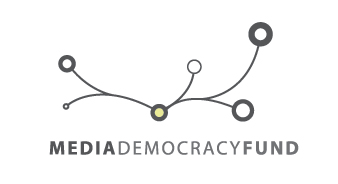
MDF Winter Update: AT&T/T-Mobile, Net Neutrality, Protest & the Internet, the Local Community Radio Act, Media Consolidation, SOPA, and Privacy
[Source: Media Democracy Fund, by Helen Brunner, December 22, 2011]
 As 2011 roars to a close, MDF wanted to take a few minutes to recount the incredible year it’s been. There have been major victories and amazing stories—overall an excellent year in the world of media and democracy.
As 2011 roars to a close, MDF wanted to take a few minutes to recount the incredible year it’s been. There have been major victories and amazing stories—overall an excellent year in the world of media and democracy.Here’s a quick look back on the top stories of 2011 and a look forward at the issues that will matter most to MDF in 2012:
- Victory! Halting the AT&T/T-Mobile Merger. Earlier this year it seemed impossible that the mega-merger could be stopped. AT&T spent at least $16 million on lobbying in the first nine months of this year and additional millions in campaign contributions to try to push this merger through. AT&T has been the single largest political contributor over the last ten years and they called in all of their chips. This victory is the culmination of MDF’s goal to build a movement capable of winning against these odds. MDF’s grantees provided the grassroots advocacy, legal support, research and media expertise necessary to halt this merger that would have harmed consumers and cost jobs.
- Protecting & Strengthening Net Neutrality. The imperfect net neutrality rules survived the year (barely) against numerous attempts in both houses of Congress to neuter the FCC’s ability to protect our rights online. Net neutrality allows the free flow of information, and is critical to maintaining an Internet that serves all people equally. MDF expects to see the resolution of the court case against the FCC—along with a lot of politically motivated rhetoric—in 2012. They’ve been strategically funding in this area since their inception, and net neutrality will continue to be a top priority area because of the massive impact it has on issues as diverse as civic engagement, human rights, public health and education.
- Protest & the Internet. From the Occupy Wall Street movement to the Arab Spring, 2011 may be best remembered as the year of the protest—and there is no doubt that the Internet and new information technologies have been a catalytic force. Mubarak’s attempt to “Turn off the Internet” became a worldwide topic of conversation that was copied by dictators across the Middle East—and even Bay Area Rapid Transit (BART) here in the U.S. The effort failed, but made the case for the importance of a free and open Internet to a democratic society better than advocates ever could. There’s no reason to suspect that protests will come to an end as we change our calendars, and new technology will have a role in keeping the national and global conversation alive.
- Victory on the Local Community Radio Act! After a long and well-fought battle for several of MDF’s long-time grantees, the Local Community Radio Act was signed into law this year. The law creates the opportunity for hundreds of new low-power radio stations across the country that can be used by communities to fulfill their own information needs. Please help spread the word about this opportunity!
- Holding the Line on Media Consolidation. In July, the public interest community won a major victory in the U.S. Court of Appeals. The court threw out the FCC’s attempt to weaken rules and allow one company to own a newspaper and broadcast stations in the same market, and upheld the FCC’s decision to retain its other local broadcast ownership restrictions. The court also instructed the FCC to better consider how its rules will affect and can promote ownership by women and people of color. MDF grantees led the legal team and strategy for this important win.
- Slowing Down SOPA. The House Judiciary Committee has been struggling with the controversial Stop Online Piracy Act (SOPA). This Act was on a fast track—fueled by the political contributions and lobbying efforts of Hollywood and Big Content industries—but the public outcry organized by MDF grantees slowed it down, causing representatives to question their positions and providing the movement more time to organize against this innovation-destroying bill. The huge number of people watching the proceedings online, the massive number of phone calls and emails to Congress, and noise on Twitter and Facebook made it difficult to pass the bill without greater scrutiny. It’s not a done deal (nothing ever is) but hitting the pause button is a major victory.
- Right to Privacy. The right to privacy and privacy issues have been the (slightly) under the radar issue of 2011, although the Federal Trade Commission just levied a fine against Facebook for its privacy violations. From social networking sites sharing your personal information with advertisers, to smart phones and apps that track your every move without your permission, privacy is a critical Digital Age issue that you’ll be hearing a lot about in 2012.
If you’re interested in learning more about MDF's 2011 grants, the full list is available on their website.


